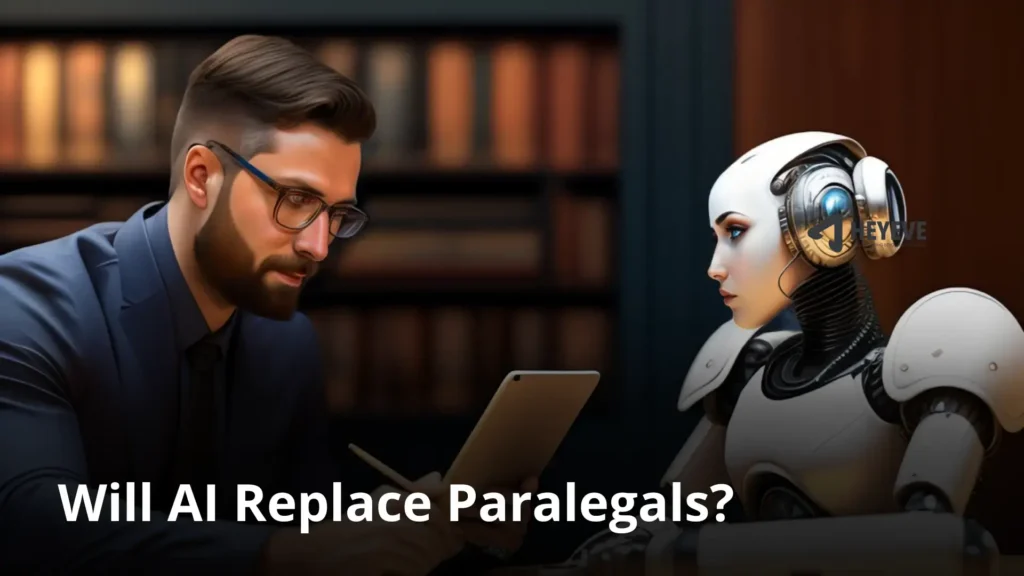Could a robot replace me?
Many paralegals are asking themselves if AI will play a bigger role as it continues to improve and show up more in law firms. It’s a valid thing to be worried about. Automation is being talked about as a solution for handling data processing and legal investigations. Everyone is talking about ChatGPT, CoCounsel, and Lexis+ AI lately. I can’t help asking: Will AI completely take over all the roles of paralegals?
People feel real fear, and there is real uncertainty. You have dedicated yourself to advancing in law, helping attorneys, and keeping your workflows organized. That a machine manage everything you need smoothly? It’s as though someone is stealing everything you’ve earned.
The reality most headlines won’t mention is that AI is working alongside us, rather than against us. As a result, paralegals now have more chances to develop, take charge, and concentrate on specific areas.
In this post, we’ll discuss: “Will AI replace paralegals?”
You’ll discover the boundaries of AI, plus cases where law firms are using it, but most importantly, how to use AI to succeed in your career.
Let’s begin.
Are Paralegals Becoming Obsolete?
I want to clear up misconceptions by making it clear: Paralegals are still needed.
AI is currently shaping the world of law. Still, transformation doesn’t always erase old traditions, it can just develop what is already there.
Smart legal tech supports more and more tasks for paralegals, for instance, helping with organizing case files, scheduling, and making documents. Even so, your entire job can’t be taken over by technology.
The report from McKinsey Global Institute found that only a little over a quarter of paralegal tasks can be automated. That shows that more than three-quarters of your work still needs you to use your judgment, skills, and knowledge.
Law firms want paralegals who are skilled with technology, rather than ones that AI will take over.
So, if you’ve been curious about whether AI will get rid of paralegals, it won’t. However, the job is changing.
Related: https://heyeve.ai/blogs/ai-in-legal-education/
How AI Is Impacting Paralegal Work Today
Artificial intelligence is already having a big impact on the legal industry, quickly.
It’s meant to give paralegals help, not replace what they already do.
- By using AI, reviewers can find important parts and problems in contracts within a few seconds.
- These platforms, Lexis+ AI and CaseText CoCounsel, use language people use to find appropriate case law in a matter of seconds.
- With AI, you can use basic legal templates right away, which takes care of much of your routine paperwork.
- Searching emails or records on e-discovery is done more easily and quickly by AI than by humans.
A paralegal can finish legal research 10 times faster by using AI than without it.
AI is helping you get things done, so you have time to focus on role-specific and productive work.
What Tasks AI Cannot Handle in Law Firms
For all the media coverage, AI does have its limits, they are still important ones.
Here’s what it cannot (and most likely never will) achieve:
- It will not be able to gauge feelings like nervousness or make an empathic response as any human can.
- Understand the less defined parts of the law: There are not many completely clear laws. They depend on their judgment when they deal with difficult or blurry situations. AI just uses what it has learned.
- Winning clients’ trust is important since it depends on building personal connections. No amount of AI can satisfy the need for human bonds that help people stick with a business.
- AI cannot tell if something is right or wrong; it’s important for people to decide that. You do.
Coming from a human place, you can adjust when things take an unexpected turn or are required suddenly.
Related: https://heyeve.ai/blogs/benefits-of-ai-in-legal-studies/
The Evolving Role of Paralegals in the AI Era
Paralegals were once simply viewed as glorified clerks who worked on the administration of files, formatting documents, and doing background research. However, the dynamic, AI-driven law firms of today afford a different image altogether.
Paralegals have become technical strategic partners.
A look at the change happening now:
- From execution to scrutiny: Paralegals today oversee the AI-generated output for accuracy, legal context, and ethical considerations.
- From assistant to analyst: With AI absorbing the repetitive tasks, paralegals have now turned their focus to higher-level activities like trial preparation, organizing information, and strategizing on cases.
- From admin support to project management: Increasingly, law firms are asking their paralegals to manage workflow processes, tools, and legal tech platforms.
AI-reporting firms recorded productivity gains of 25%, a 2024 LegalTech News report stated, but only when paralegals were properly trained to use these tools.
AI is not downing paralegals. It’s upping their game.
Upskilling Paralegals for AI-Enhanced Careers
If you want to remain important in the legal field, read on. What you need is to upskill.
AI is upgrading the equipment, but it’s people who still make the strategies work.
Check out these skills that paralegals should focus on building early on:
1. Knowledge in Legal Tech
Find out how to work with Relativity, Filevine, CaseText, and Clio.
2. Data Literacy
Learn to look at legal analytics and be able to identify patterns in big data.
3. Project Management
Learn how to organize cases and coordinate teamwork by using Trello or Asana.
4. AI Tool Fluency
You should become familiar with AI writing assistants, software that automates document tasks, and programs used in e-discovery.
5. Soft Skills (that don’t exist for AI)
Empathy helps, along with the ability to make ethical choices, talk well, and make strategies.
Thomson Reuters discovered that 89% of legal professionals are convinced that learning new tech will lead to better career paths in the next 5 years.
The better you are at tech, the more likely law firms will trust you in important situations.
Suggested Read: https://heyeve.ai/blogs/ai-in-lawyer-training/
Expert Opinions on the Future of the Paralegal Profession
One fact that leaders in the industry all agree on is that paralegals are here to stay.
Even so, those standards are not what they used to be.
As Filevine CEO Ryan Anderson explains:
Innovation in law firms now relies heavily on paralegals. Lawyers are handling the platforms, checking over the results, and making sure everything is accurate and efficient.
The latest TechReport from ABA 2023 mentions:
Paralegals help connect the old methods of law practice with new automation.
ILTA research revealed:
Firms that employ tech-trained paralegals say they can get cases prepared up to 40% faster.
The takeaway?
When you mix technical expertise with legal learning, you gain power.
Paralegals mixing technology and process will drive the next phase of change in the law.
Addressing Concerns About Job Loss
It’s fine to feel a little uneasy about AI. You could ask yourself:
If software can make my job quicker, why wouldn’t my firm use it and let me go?
Let’s see what the facts show us.
According to the U.S. Bureau of Labor Statistics, employment for paralegals should increase by 14% from 2021 to 2031, faster than the average rate for many other jobs.
Research from McKinsey found that just 9% of paralegal work can be completely done using technology. Other decisions must be handled by humans because AI cannot do well with oversight, communication, logic, and decision-making.
AI does not cause a loss of jobs. It takes away some of your responsibilities.
It means you still have a job to do. The industry is changing. You’ll reduce the amount of time spent on simple office tasks and instead focus on direction, talking to clients, and making key choices.
It is those paralegals who succeed who regularly say:
Artificial intelligence doesn’t frighten me. I’m going to keep it in my car.
Are you prepared for how AI is changing the legal industry? Learn how HeyEve enables attorneys and paralegals to operate more efficiently rather than laboriously.
How Law Firms Can Strategically Use AI
Smart law firms aren’t looking to get rid of their employees and use robots instead.
They’re interested in finding out: “How can we enable our team to work better and more deeply?”
See how AI is deployed by e-commerce sites in the right way:
- Clients use AI to do basic tasks such as checking documents, analyzing simple contracts, and notifying staff about deadline reminders.
- With NLP, searching documents is simpler for paralegals and lawyers—now, they don’t have to go through every page by hand.
- With AI, these legal platforms let you work more efficiently by taking care of repetitive duties and making sure your team doesn’t make mistakes.
All the same, people must still ensure that AI is working correctly.
No matter how minor the problem, missing a clause, a crucial point in the law, or breaching privacy could have big consequences. For this reason, law firms are counting on well-trained paralegals who are familiar with technology more than before.
Building a Future-Proof Paralegal Career
If we’re honest, change is already happening. But it’s up to you to decide.
You may choose to sidestep it, but choosing to embrace it will help you be a leading paralegal.
Take these simple steps to do that:
Learn Legal Tech Tools
You can take online lessons in tools such as Relativity, Everlaw, or CaseText. You have the chance to gain free certifications with a number of them.
Embrace AI Training
Coursera, edX, and YouTube all have courses that focus on AI and use it in law and research.
Strengthen What AI Can’t Do
Optimize your skills in speaking with others, feeling for others’ feelings, being ethical, and in decision-making. These are what make you strong.
Join Communities
Get connected to others by signing up for groups like ILTA, LegalTech News, or LinkedIn groups for attorneys.
Keep Evolving
Don’t count on your company to teach you! Be the one who introduces new approaches or devices to your team.
Which frame of mind helps you win?
“AI may be powerful, but when I’m there, it will work better”.
Read Also: https://heyeve.ai/blogs/ai-platform-for-legal-training/
Conclusion – Will AI Replace Paralegals?
Now, let’s link everything we have covered.
Is AI here to take away the jobs of paralegals?
No. It will clear away old ways of doing business.
The legal sector is changing very quickly. There are now AI solutions that simplify research, automate documents, and quickly move work forward. Even so, they are not able to think, experience emotions, or use judgment like humans.
Those paralegals who update their skills, get good at teamwork, and introduce fresh ideas will thrive through these changes.
They’ll be the ones who run it.
People who consider AI a valuable tool have a better chance in the future.
You can make mistakes; it’s okay. As long as you’re open to learning, you’ll do well.
Frequently Asked Questions (FAQs)
Are AI tools available for paralegals?
Yes. Lexis+ AI, CaseText CoCounsel, Relativity, and Filevine were developed to help paralegals manage legal research, review documents, and automate their work processes.
Can paralegals stay competitive in an AI-driven industry?
Absolutely. With new skills in legal technology, better communication, analysis, and awareness of AI, a paralegal becomes more important to the company.
How can AI support the professional development of paralegals?
With AI to help, paralegals spend more time on important tasks such as strategy, handling cases, and connecting with clients, which helps their careers.
What are the limitations of AI in legal work?
AI is not able to take over what is unique to human judgment, empathy, ethics, or creativity. It has the power to give information, but it does not understand situations with complex legal meanings or make ethical judgments.
Will AI eventually replace legal assistants, too?
Not likely. Legal assistants organize appointments with clients, keep the calendar updated, and communicate private or sensitive details to others, all of which require people skills and attention. These jobs will change, but they are not going away.


